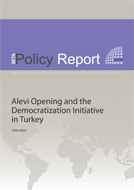The “Alevi Issue” is one of the most complicated and, at the same time, largely misunderstood problems in Turkey. Conflicts, resentments, grievances, and perpetual fears about Alevis that have existed for centuries have been publicly voiced through different mechanisms; yet, the message had never been understood thoroughly by the interlocutors of the Alevis. The discussions on the issue in various social and political contexts have often revolved around a rather limited list of Alevi identity-based claims.
The JDP government has undertaken a series of steps to understand and respond to Alevi identity-based claims. Popularly known as the “Alevi opening” (Alevi açılımı), the initiative is a turning point in terms of the Turkish governments’ approach to problems of Alevi citizens in Turkey. The Alevi Opening is the first systematic effort to address Alevis’ identity-based contentions.
This step is also part of the broader policy of “Democratic Opening,” which addresses the burning problems of various ethnic and religious groups (Kurds, Alevis, religious minorities, and the Romani people) in Turkey. The objective of “Democratic Opening” is to reconcile the Turkish state and the marginalized segments of Turkish society.
This brief provides an analytic background for understanding the governing JDP’s “Alevi opening” initiative, which was launched in the summer of 2007. The issues mentioned in the list of Alevi identity-based claims, obstacles to the fulfillment of these issues, and the methods and the processes of the ongoing Alevi Opening are elaborated. This analysis argues that only a holistic intervention can bring about a sustainable reconciliation process between the Alevis and the Turkish state establishment as well as between the Alevi and Sunni citizens. In order to provide a holistic analysis, political, legal, psychological, cultural dynamics of the Alevi issue are emphasized here. Intervention insights and policy recommendations are formulated, consistent with the analytic perspective.
***
Contextualizing The Issue Alevis, one of the largest groups in Turkey, are geographically spread throughout Turkey. There is no sect-based data that would reflect the actual population of Alevis in Turkey but the estimates range from 5 million to 25 million. Arguments about the population of Alevi citizens are part of identity politics; therefore, it is better to assume a population somewhere between those two figures. Alevi identity has traditionally been a strong communal group identity1 with clear cultural boundaries, moral values, rituals, and shared collective emotions. This identity, historically and culturally, has sectarian origins, which have been maintained for centuries through an endogamous social order in rural contexts2. Specific rituals and cultural practices played important roles for the maintenance of a strong identity. The “Alevi Issue” is one of the most complicated and, at the same time, largely misunderstood problems in Turkey. Conflicts, resentments, grievances, and perpetual fears about Alevis that have existed for centuries have been publicly voiced through different mechanisms; yet, the message had never been understood thoroughly by the interlocutors of the Alevis. The discussions on the issue in various social and political contexts have often revolved around a rather limited list of Alevi identity-based claims. It would serve us better to think of contemporary Alevi identity politics and Alevi activism as a struggle for recognition of Alevi identity. The common claim made



